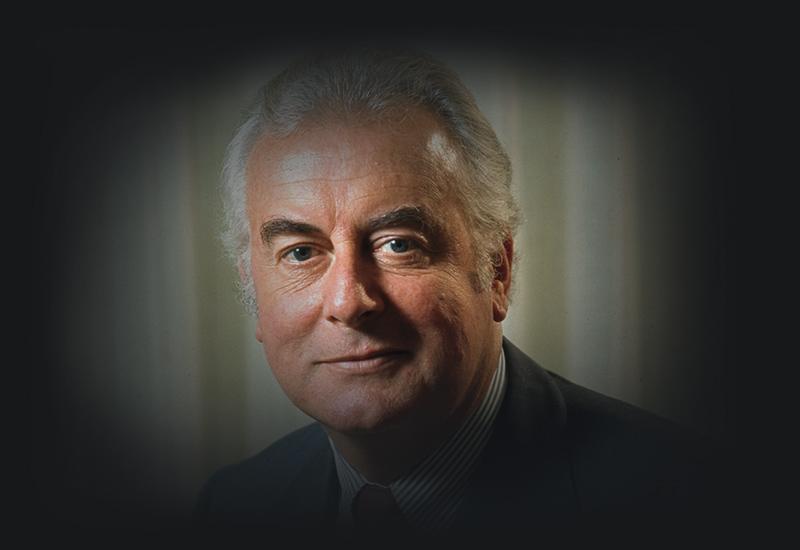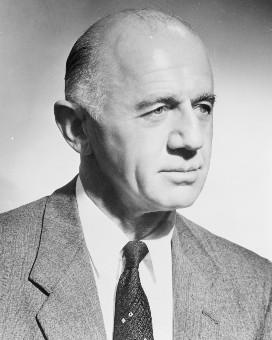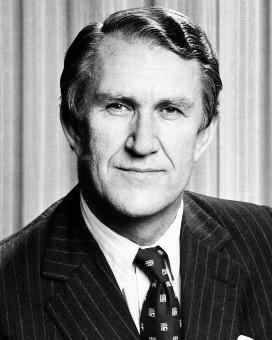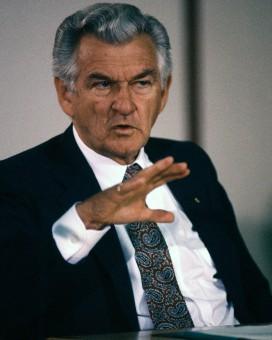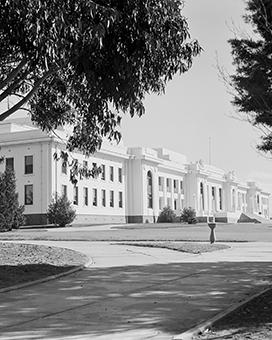Edward Gough Whitlam was Leader of the Opposition for 2 years after the dismissal of his government in 1975, and he remained in parliament until 1978. Among his subsequent official roles were his 3 years as Australian Ambassador to the United Nations Educational, Scientific and Cultural Organization (UNESCO) in Paris. He also chaired the Australia–China Council and the Council of the National Gallery of Australia and held various visiting professorships and committee memberships.
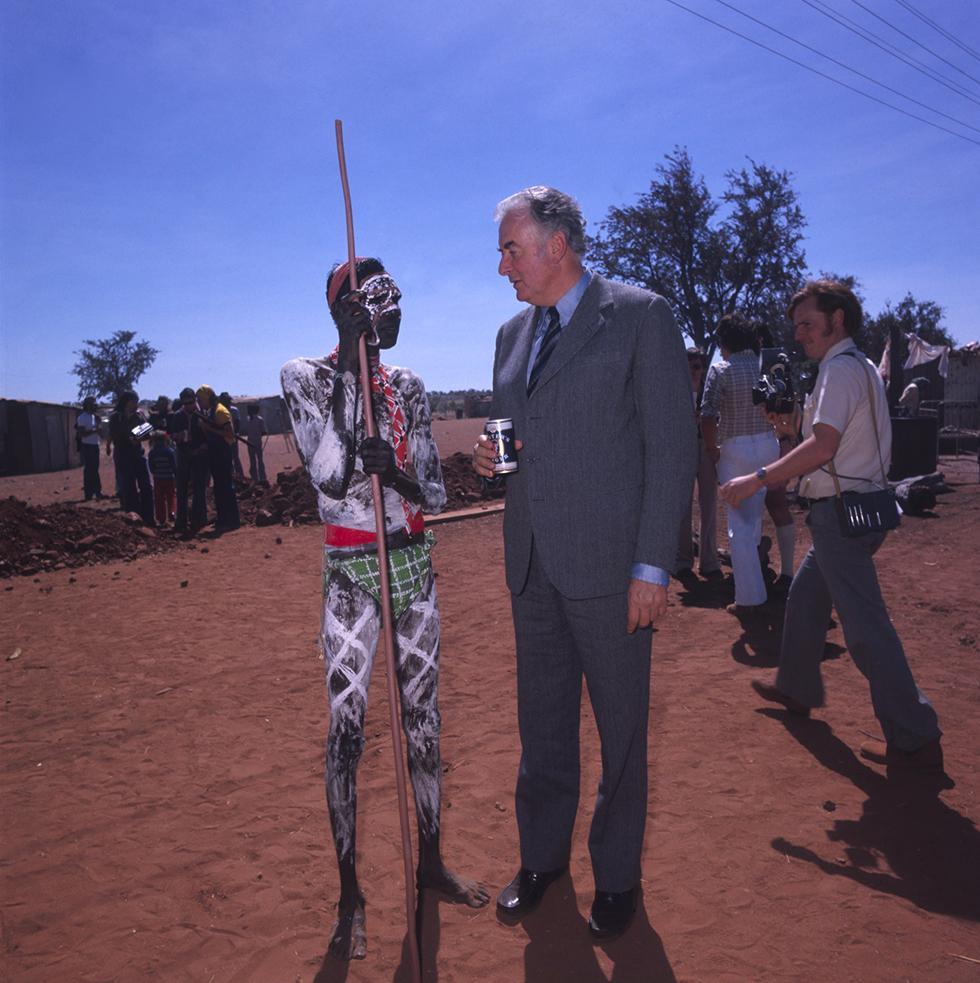
Gough Whitlam talking with Smila Underwood at Wattie Creek, 1980. Five years earlier, Whitlam took part in a symbolic ceremony to mark the return of Gurindji land to traditional owners. NAA: A8598, AK2/5/80/93
A public life
Whitlam remained Leader of the Labor Party and Leader of the Opposition until 1977. On 22 December 1977, he stood down as party leader after Labor’s defeat in the federal election that month and was succeeded by Bill Hayden. Whitlam resigned from his parliamentary seat on 31 July 1978 and was made a Companion of the Order of Australia the same year.
He became the first national visiting fellow at the Australian National University in 1978, and subsequently held visiting professorships at Harvard University in the United States in 1979 and at Australian universities. During his parliamentary career, he had served many times on constitutional inquiries, including the joint parliamentary committee on constitutional review in 1956–59 and the federal–state Constitutional Convention in 1973–77. In 1985, he was appointed to Australia’s Constitutional Commission.
In 1983, the Hawke government appointed Whitlam as Australian Ambassador to UNESCO in Paris. Whitlam’s brief was to gain Australia’s transfer from the western European group to the Asia and Pacific group, and he maintained support for UNESCO against moves by conservative British and US governments.
At UNESCO, Whitlam also served on the Independent Commission on International Humanitarian Issues and the World Heritage Committee. After the High Court dismissed challenges to the external affairs power in Koowarta’s case in 1982 and in the Tasmanian Dams case in 1983, the constitutional door was open to implementing international agreements in Australian law. Whitlam remained a determined campaigner for Australia’s adherence to United Nations human rights, environment and heritage instruments. The World Conservation Union made him a Member of Honour in 1988. In 1989 he chaired the General Assembly of the World Heritage Convention.
From 1986 to 1991, Whitlam was chair of the Australia–China Council, and from 1987 to 1990, he was chair of the Council of the National Gallery of Australia.
In 1993, Whitlam founded the Hanoi Architectural Heritage Foundation and was a member of the Australian Olympic Committee delegation to Africa, a corresponding member of the Academy of Athens and an honorary fellow of the Australian Academy of the Humanities. In 1994, he received the Redmond Barry Award from the Australian Library and Information Association. Gough and Margaret Whitlam were also members of the 1995 Sydney bid team that wooed and won support for the Olympic Games to be held in Sydney in 2000.
Whitlam published several books and articles, including his own account of the 1975 dismissal, The Truth of the Matter in 1979, The Whitlam Government 1972–1975 in 1985, and Abiding Interests in 1997. He remained in great demand as a lecturer on political and constitutional issues, including the move for Australia to become a republic.
From 2000, Whitlam was involved in the development of the Whitlam Institute at the University of Western Sydney, helping with the transfer of materials about a public life that has spanned more than 50 years. As well as providing a research centre, the Whitlam Institute promotes public policy research, public engagement and education.
Among historic documents donated to the Whitlam Institute is a pamphlet from the 1952 election, when Whitlam first entered parliament, and his 1983 Commission of Appointment as Australian Ambassador to UNESCO, signed by Governor-General Sir Ninian Stephen.
At the Australian Labor Party national conference in April 2007, the Whitlams were made national life members of the party they had both belonged to for over 60 years.
The Whitlams remained active and sought-after speakers at national events. Both were in parliament for the Apology to Australia’s Indigenous Peoples, with former prime ministers Malcolm Fraser, Bob Hawke and Paul Keating.
Gough Whitlam passed away on 21 October 2014.
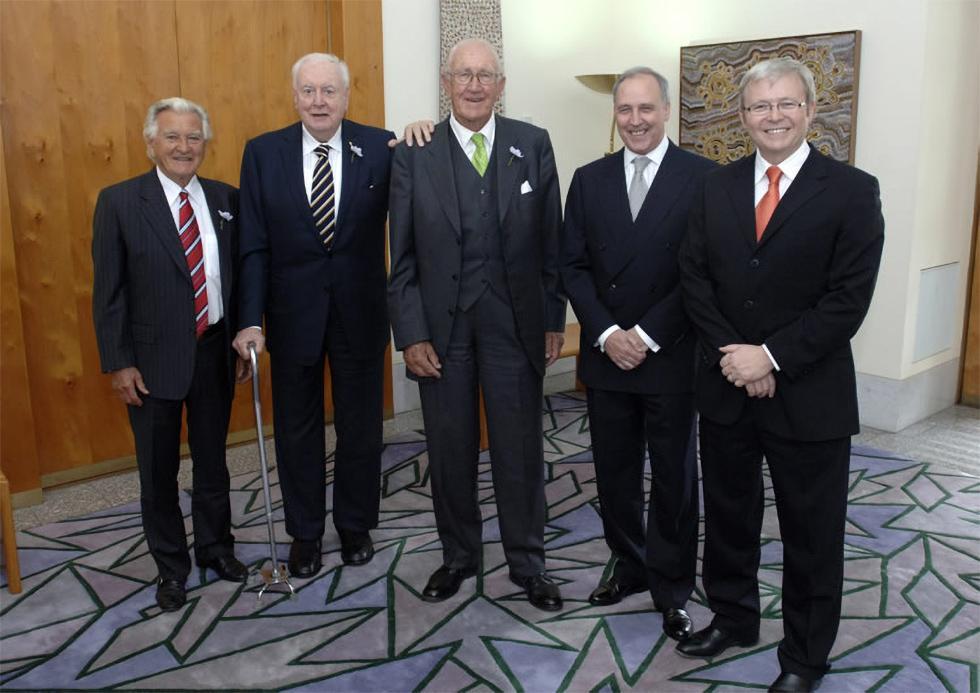
Former prime ministers Bob Hawke, Gough Whitlam, Malcolm Fraser and Paul Keating, and Prime Minister Kevin Rudd at the Apology to Australia’s Indigenous Peoples, Parliament House, Canberra, February 2008. AUSPIC
Sources
- Hocking, Jenny, Gough Whitlam: A Moment in History, Melbourne University Publishing, Carlton, 2008.
- Lloyd, Clem, ‘Edward Gough Whitlam’, in Michelle Grattan (ed.), Australian Prime Ministers, New Holland, Sydney, 2000.
- Walter, James, The Leader: A Political Biography of Gough Whitlam, University of Queensland Press, St Lucia, 1980.
- Whitlam, Gough, Abiding Interests, University of Queensland Press, St Lucia, 1997.
- www.whitlam.org

